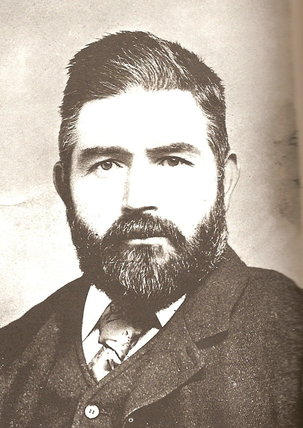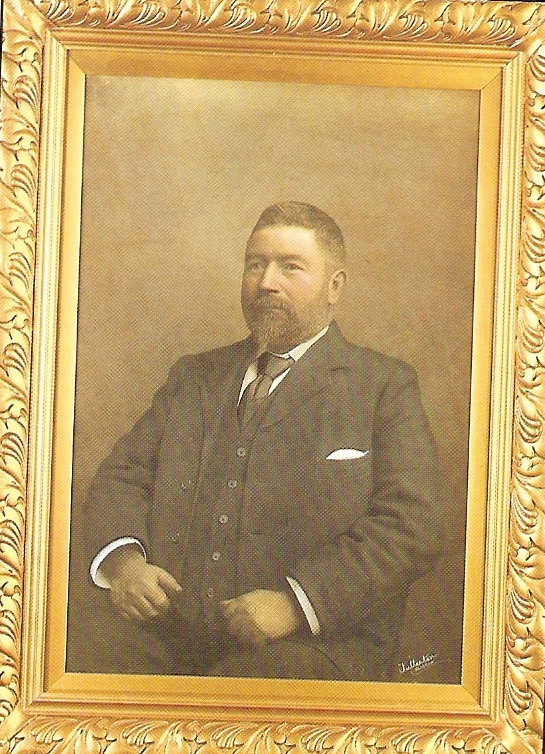Celtic Board – Past | Celtic Board | Celtic’s Foundation | About Celtic
“[The man] to whom the Club owes its existence!” – Willie Maley
Details
Name: John Glass
Born: 1851
Birthplace: Glasgow
Died: 2nd June 1906
Celtic President/Chairman: 1890-97
Celtic Director: 1897-1906 [to check]
John Glass

A strong and stocky man, Glass was a builder by trade, working in partnership with his brother in a firm. From proud Donegal stock (born in Glasgow to parents from Ireland) he had a presence and sense of authority which was impossible to ignore. Intelligent and hard working, Glass worked day and night to ensure Celtic had a team and stadium to be proud of.
Prominent in Scotland’s Irish community circles, including those with Irish home rule political allegiances, it’s no surprise that he became involved with the founding and establishment of the club, although on other hand possibly for some a bit of surprise taking in the increasingly high profile nature of the position of a man once described as a”silent, but hard-working man“.
He was the man, more than any other, who dragged Celtic and Scottish football into the professional world. and he was also the man who needed to do little persuading of various Hibs players in order to assist them to come to Celtic due to the situation that Hibs were leaving themselves in. For this, many Hibs fans have a wrong impression that he was a main instigator of the downfall of the original Hibs club in Edinburgh, but much of that is mistaken when you look at the facts.
John Glass gave the players who came over a stable job in a developing and progressing club in a fast changing market, something that the original Hibs were unwilling to deal with. John Glass observed the workings of professionalism in England in 1885 and correctly assumed that Scotland would follow. Hibs were sticking their heads in the sand, trying to preserve (sh)amateurism and keeping their Catholics only policy. Celtic were realistic and instead of both clubs floundering under dogma, Celtic modernised and adapted. Hibs didn’t.
Probably, the most significant move that John Glass made, was his persuasion of James Kelly to come to Celtic. A forward who had been capped for Scotland, his capture was a star signing that the club could not miss out on. There was a lot of work done to entice him to choose Celtic above Hibernian (amongst others), and John Glass was the man who more than made the difference. Under him, John Glass and his committee made it a priority that the most important aspect was the team on the pitch, and it was said that if Celtic had not obtained James Kelly then it could have ended up a case of “No Kelly, No Keltic!“. That’s how important Jack Glass’ involvement was to Celtic’s survival.
Celtic was not the first “Scottish-Irish” football club, with others over the period having been found and foundered, including one or two others who were also called Celtic. The patronage in name and financially by men like John Glass enabled Celtic to hold its own against the establishment clubs of whom had treated the other “Scottish-Irish” clubs poorly and with much disdain. So John Glass’ involvement beyond the founding and romanticism under Brother Walfrid were a vital component for the club’s existence.
One contentious point on John Glass are the events surrounding the club stopping paying money to the Poor Children’s Dinner Table. This must be taken in light of the then circumstances, against which that the club were in debt for which John Glass stated once clear then the club would be “only too willing to do whatever it could to assist the charities mentioned“. Black mark though in that at the same meeting as this was said, £100 was approved for the treasurer. For a club that was founded to help charities, the club was beginning to go back on its roots. In fairness, the size of the club meant it could not just pay all its income to charities in the face of increasing competition and professionalism, whilst the growth in the organisation of fans meant a lot of charity work in time was also done by them. Administration and operational staff at the club could not be expected to be paid a pittance to manage and handle the scale of the growing club. The whole issue is not simply a black and white matter as some paint it.
Glass was later described in a history on Celtic by Willie Maley as the man ‘to whom the Club owes its existence‘.
He died on 2nd June 1906 but his legacy will live forever in the shape of Celtic.
Articles
Brother Walfrid’s Right Hand Man
The name of John Glass repeats itself throughout research into the creation of Celtic. Undoubtedly, Brother Walfrid was the architect, the instigator, the motivator and the conduit to all the facets that would come together. John Glass, however, was the master builder and the catalyst for it all to happen.
His importance should be recognised. John Glass was a joiner, a man with many contacts in the building trade and a son of Donegal. He was also, we are told, a man that could ‘charm the birds down from the trees’ such was his charisma. This charm and persuasiveness would be a highly useful tool in Celtic’s formation, as Glass is widely acknowledged to be the man who persuaded a number of famous football players of the time to join the fledgling Club. A humanitarian and a meticulous organiser, Glass was also a leader of men, and specifically a dignified and highly respected leader of the Irish Catholic community. John Glass was THE politician sitting at the round table deliberating the creation of Celtic.
Glass was later described by Willie Maley as the man ‘to whom the Club owes its existence‘.
Ferguson and Glass organised several political rallies at which Michael Davitt addressed the Highland crofters. The question must therefore be asked: did the name ‘Celtic’ originate from this popular political influence of the day, and did Brother Walfrid and John Glass see in this name a method to celebrate Irish-ness, symbolise Irish-ness, yet simultaneously join hands with Scottish Celts? After all, historically speaking, the peoples of Ireland and Scotland were one and the same – Celts!
Quotes
“Will it Succeed? It shall Succeed!”
John Glass on being questioned in the early days on Celtic’s future
‘…a working joiner to whom, in my estimation, the Club owes its existence, as he never shirked from that time till the day of his death to further the project which to him appealed as his life work’.
Willie Maley describing John Glass
“Mr Glass was born in Glasgow of Irish parents fifty-one years ago.His father came from Donegal.Though he has not served on any public board,there is not a better known figure in Irish and catholic circles in the city.He is a familiar figure at th H.G.B. meetings and at national conventions.He has taken a prominent part in the promotion of Irish Forestry,and has filled the position of president and secretary of St.Mary’s League of the Cross. He is a great favourite in athletic circles and was for eleven years president of the Celtic FC. On its formation as a limited company, he was unanimously re-elected, but declined the honour. He is still one of the directors.”
Appointed a Justice of the Peace (JP) through Lord Provost Chisholm. Nov 1 1902
“Let them scoff and jeer. Celtic will yet win to their proper position by their merits and those who scoff today will one day have to applaud!”
John Glass


